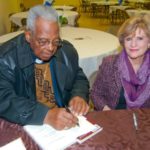
by Suellen | Meeting the Challenges, Writing a Book
I am thinking back to a special August day in 2010. My husband and I had just celebrated the birth of a beautiful grandson, so I was already on an emotional high. And then as we arrived back home and saw the box on our porch, I could hardly contain the excitement.
My books had arrived! My very own books!
With trembling hands, I opened the box and saw my name staring back at me. My beautiful books. All the work I had put into this masterpiece (at least to me, it was a masterpiece) – had paid off.
It was done. My very own book ready to give and to sell. Ready to bring encouragement to those who read it. Ready to open new doors for me since now I was a published author.
I began to reflect. I had wanted to write this book for a long time – mulling over ideas for many years. Why had I waited so long to actually do it?
Many things had held me back from experiencing this moment.
There had been confusion. And overwhelm. How could I write a whole book? What if I didn’t have enough to say? Who would really want to read it? Would it cost too much? And on and on…
Obstacles of thought and emotions. Fear, anxiety, and overwhelm.
I just wasn’t sure that I could do it.
Do you relate to what I’m saying? Do you have obstacles of mind and emotions which hinder you from accomplishing what you want?
Let’s face it. Each of us has obstacles in our life’s journey.
Some of these are because of our environment, our health, or our unique circumstances. We may be dealing with sickness in ourselves or a close family member. We might be going through a major life change – such as a divorce or the death of someone close.
Sometimes demands are made on our time and energy by good seasons in our lives. We may have several small children who need an usual amount of attention. Or we may be getting married or starting an engaging career.
Yet when life is rolling along at a more even pace (if that ever really happens), we can still face obstacles in our minds. Our thoughts, our emotions, and our habits can cause us to stand still and not move forward.
We may occasionally dream about the “what if’s,” but we don’t take any steps toward accomplishing those dreams. We treat our lives as if we will either win the lottery – or not. The big moment will come, or it won’t.
And in the meantime, we remain idle without moving toward those dreams.
Well I have met many people who have a dream of writing a book. Maybe they have a great story concerning their own unique experiences. Perhaps they realize that a book would be just the thing to introduce Jesus to those who don’t know Him. cement their credibility in their field. Maybe they want to make some extra money from the book sales.
There are many reasons for writing a book.
Yet here is the truth: Many talk about it, but very few ever really get it done. They dream and they talk, but they never actually do it.
I understand this dilemma, because that’s the way I was for many years. I would think about it. I would even occasionally jot down a few notes. But I just couldn’t get over that unidentifiable roadblock. It just seemed too hard. Out of reach. I would put it aside and forget about it for awhile.
Well my day finally came, and what made that switch for me?
I began studying about self-publishing. I read books, attended seminars, and online webinars. Somehow, during that process, I gained courage and began the journey. One step at a time, I completed the trip and published my first book.
I realized that those who were writing their books were just like me – like you. If they could do it, then so could I.
Now several years later, I have more than 20 books published in paperback and on Kindle. Once I started the process, each one became easier.
Now my goal is to help others who were just like I was.
Maybe you are one of them.
If you have been thinking about writing your book but haven’t done it yet, then maybe overwhelm or confusion is holding you back.
In my series of 12 On Demand Webinars, Audios, Transcripts, Action Step Sheets, and Bonuses, I take you step by step through the process. Your Planning, Writing, Pre-marketing, Designing, and Publishing can be accomplished by you – just as they were by me. One step at a time – and it’s done.
Please check out the opportunity. At https://OurCBI.com. The world needs to hear from you.
And for a limited time, the entire course will be half price.
In the meantime, Keep on Soaring!

by Suellen | Meeting the Challenges, Vision and Goals
When I was a child, we had fill-in-the-blank Saturdays. Sometimes we had some extra time to sleep. Often we would take excursions just for fun.
Then there were those other Saturdays. The kind when you would wake up to a morning of “Clean-out-the-closets.” Or “Work-in-the-yard.”
Ugh!
Those Saturdays were boring. Not fun at all!
Now on the Saturdays when we had fun activities on the calendar, I would hop out of bed – even before the alarm went off. There was excitement in the air as we packed our picnic lunches or loaded our beach equipment.
Not so on those “other” days. My Dad would have to call to wake me several times before I would hear him. Then I would drag to get dressed. Drag to eat breakfast. And drag around even more as I attempted to put off the inevitable.
What was the difference? Why did I eagerly wake up on some days and dread facing the day on others?
Motivation. The kind of motivation which only comes by having a clear vision of what will be happening. (more…)

by Suellen | Writing a Book

Starting your book can be a big deal. In fact it is a big deal. What you have to say is important.
And leaving your messages in a hands-on touchable form can be very significant.
Several years ago my husband and I purchased a house which had been in his family for over 130 years. A couple of generations earlier, the owners had been some aunts who were college professors. They never married. Their entire lives were given to teaching at a small, liberal arts college.
The two ladies were avid readers and life-long learners – and there was plenty of evidence to prove it. Every room in the house had bookcases loaded with books and magazines. In the attic and in upper regions of the packed closets were boxes of research and papers.
On several lazy afternoons I found myself upstairs in “Aunt Bess’s” old bedroom, rummaging through some of the boxes. My favorites were the many letters and cards they had received in the late 1800’s and ealy 1900’s.
The handwriting on each letter was like a work of art. You could see where the pen had been freshly dipped into the ink, and dripped on the paper. Every card was like a masterpiece of calligraphy.
But the most important part to me was what they said. The messages concernng the growth of the town and the college. The inquiries about other professors and their importance to the region.
The letters which were the most valuable were those which expressed special thoughts concerning Jesus, the strength of the church, or problems of the nation or region. Those were the ones which reflected the pulse of the times.
Some of the letters were written on a typewriter, but all of them were on paper. Physical copies which could be stored and handed down from generation to generation.
Fast forward a century, and paper is sometimes thought of as obsolete. We repeatedly opt into online statements and receipts. We buy digital books and magazines. We communicate with email or texts.
All of that is terrific. It’s much faster and easier.
But wouldn’t it be nice to leave someting tangible for your descendants? Wouldn’t your grandchildren like to know what you have to say? (Especially when they are older). Wouldn’t future generations like to have something they can hold in their hands? Something which relays your thoughts in this day and age? Something which describes the psychology of this specific time in the earth?
Digital methods are wonderful for quick and easy communication, but those messages won’t last forever. They always require special equipment – whether phones, tablets, or computers – to acess them. And as devices gain in sophistication, old files are not always obtainable.
So back to the value of books.
If Aunt Bess’s letters had been digital, they would have been long gone. I never would have been able to read and enjoy them.
As you are making a decision about writing your book, these are things to consider. You want to leave something that is lasting. And tangible. And transferrable from generation to generation.
Your book may be your autobiography, ideas for raising your children, or lessons from the Bible – with your special emphases. The very fact that you are putting on paper ideas which can be passed on from generation to generation is a very significant thing.
So let me encourage you.
If you have thought about writing a book, then do it. The next posts will be about tips for making it happen. With a few techniques – and tricks – you will be well on your way to having something to pass on to your grandchildren.
So Where Do I Start?
Now I know how it is. Your next thoughts will be how in the world do I get started? Very often we have many ideas floating in our heads in a disorganized fashion.
How do I get these thoughts into some sort of coherent form? What do I really want to say? Are these ideas important enough for anyone to want to read them?
The answers come one item at a time. When you write a book, you are beginning a journey, and you take it one step at a time. That’s how it’s done.
So take a deep breath. Relax. And begin to define your goals.
Who are you writing for? Your family? Women? Men? What ages are you trying to impact?
What do you want to accomplish with your book? Is it for education? Inspiration? Humor?
If you will spend some quality time in this early planning stage, your writing will be much easier. You will be able to stay focused as you complete your writing.
For additional ideas about this early planning stage, grab a free copy of my E-book, Want to Write a Book? Engage Your Mind.
You may grab your free copy HERE.
In the Meantime, Keep on Soaring,


by Suellen | Uncategorized, Writing Tips
Has this ever happened to you?You’re all excited about writing an article, report, or book. You open up a fresh document on your computer. You type in your file name, maybe a title, maybe even a few sentences.
But then it feels like your brain shuts down. Suddenly you find yourself just staring at a nearly blank screen. The words don’t come.
Uh oh, you have writer’s block.
If you do any writing at all, you’ll probably experience writer’s block from time to time.
Here’s how to overcome it…
Of course, prayer is always the first order of business. Relax and ask the Holy Spirit to speak to your heart and remind you of what He wants to say.
Then here are some additional practical tips.
Get Inspired
Sometimes you get stuck simply because you’re tired of looking at the same four walls, the same computer screen, etc. It helps if you can do something to kick start your creativity and give your brain a change of scenery. For example:
- Put on music that inspires you.
- Get out of your usual office and go someplace completely different, like a park or a coffee shop.
- Spend 15-30 minutes doing something different, such as exercising (which will make you feel better).
Copy a Good Piece of Text
This is a way to force your brain to get in the “groove” of writing well. Simply take a passage from one of your favorite authors and start copying it by hand. You can also copy poetry, good sales letters, or anything else that’s well-written.
Naturally, you’re not using this content for anything. You’re just jump starting your own creative process by really thinking about someone else’s well-written piece.
Write Anything That Comes to Mind
Another way to get over writer’s block is to just start writing anything that pops into your head. If you have to write about this week’s grocery list, fine.
If you have to start off writing, “I don’t know what to write” two dozen times across the top of the page, fine. But the point is, just get your fingers moving across the keyboard. After about 20 minutes, your mental “log jam” should be broken up and your creativity released.
Create a Piece About Something Else Entirely
Sometimes it helps to write about something else that isn’t even remotely related to the thing that you need to write about.
So if you need to write an article about Christian Living, you can start by writing an article about how to tie your shoes. Or if you need to create a knowing who you are in Christ, then write a story about how you met your significant other.
Again, this is just a way to loosen up your creativity and get those fingers moving across the keyboard. Once you turn to the piece you do need to write, it will likely go much more smoothly.
Start in the Middle
Have you ever noticed that the introduction is often the hardest part to write? That’s because you use it to give a sneak peek at what the rest of the article, report or ebook is about. But if you haven’t yet written the rest of the content piece, then it’s easy to get stuck on the introduction.
The solution is simple: Start in the middle.
Just skip the intro and go straight to the next paragraph or the first chapter. Then you can do the introduction last, which makes it much easier since now you know exactly what all topics you covered in the rest of the piece.
In sum…
Every writer gets the dreaded writer’s block from time to time. However, don’t let it slow you down.
Next time your brain is moving like molasses, just use the tips above to jump start the creative process!

by Suellen | Writing Tips
Let’s be honest. Have you ever noticed that a lot of Christian writing is actually fairly boring?
Yet even if everyone else is creating dry, mediocre content, you don’t have to. You can determine that what you say will be interesting as well as informative.
And one way to do that is to really connect with your audience.
So how do you create this connection between your words and the hearts and souls of your audience?
let me share a couple of tips…
Tell Stories
Stories are good ways to connect with your readers, because a story tends to help you form that emotional connection. It helps the reader identify with you. And a story is much more memorable than simply telling a reader what to do.
You can write this story about you or someone else. Either way, however, the story will be more impactful if the main character is very similar to your readers.
So if your readers are stay at home moms, then you’ll connect to them better if your story is about a stay at home mom who overcame some of the same problems she faces. A story which inspired you.
A story can also help to demonstrate to your readers that you really understand them and their problems. And when a reader feels like the author understands him, you can bet he’ll keep reading.
Create “Reader Oriented” Writing
Your readers have perhaps read plenty of articles, reports and ebooks on the same topic as the one you’re writing about. However, a lot of this content is “author oriented.” That means that it seems to be more about the author rather than the readers
Example: You might read a book about having a good marriage in which the author seems to boast repeatedly about his credentials or delve into personal stories that actually aren’t of interest or relevant to the reader.
One way to quickly check if your writing is author-oriented is to see how many times you’ve used words like “I” or “me” versus how often you use words like “you” and “yours.” You want to use more “you” writing, since this is reader-oriented writing.
Let me give you an example:
- Author-oriented writing: “I’m going to tell you about how I lost weight.”
- Reader-oriented writing: “You’re going to discover a weight-loss trick that’s worked for me – and it will work for you, too.”
Engage the Audience
If you’re writing a “how to” article, then it’s easy to fall into the familiar pattern of writing a straightforward article: “This is step 1… this is step 2…” Basically, it’s the same kind of article everyone else publishes.
Instead, engage your audience by freshening up your writing. This includes:
Adding in your own tips. In particular, include unique tips and tricks not found anywhere
Using stories to illustrate points. Be sure to engage all five of your reader’s senses to really bring him into your story.
Inserting examples to make things more clear. Just look at the way I gave an example of reader versus author-oriented writing above.
Including “spiced up” writing. For example, instead of merely describing someone as nervous, you could say “He was so jittery he could not stay in his chair.”
You’ve painted a picture in their minds which is always more impactful.
In sum…
You’re writing with a purpose, whether it’s to teach your readers something or just to develop a good relationship with them. However, these goals are possible only if your writing engages and connects with your audience.
Use these tips and watch your connections flourish!
H
















